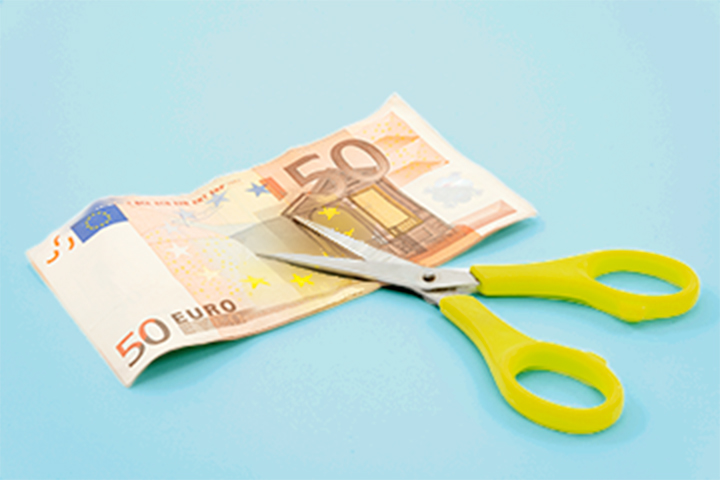The lazy marathon investor

Keytrade Bank
keytradebank.be
March 27, 2019
(updated February 09, 2022)
5 minutes to read
Lazy people do not run marathons. They have to train really hard, for months at a time, because the basic version of the human body is not capable of running for 42.195 kilometres. The body needs a serious upgrade for that.
If you want to invest like a marathon runner, it's okay to be lazy. Better even. Laziness is a virtue in investment sports, because marathon investors are better investors than sprinting investors. In order to convince you of this statement, I shall give the floor to Zanna Massaert. Zanna is the home investor of Mister Market Magazine, and explains why marathon investing is the best possible investment strategy in the stock market.
'I jog. According to the books, I have a healthy mind in a healthy body. In practice, after jogging I am a mental and physical bright red, dripping, panting and squeaking wreck, so I doubt if I can believe the books just like that. And I certainly don't run 42 kilometres, like the Ancient Greek who jogged from Marathon to Athens a long time ago.
I do run a kind of marathon on the stock market. Not 42 kilometres, but 42 years. I already have 22 of those years behind me. I have passed the turning point.
The big challenge for a marathon investor like me is to reach the finish line. Persevering, therefore, by dosing forces, keeping the rhythm, staying focused, maintaining peace of mind. Never get reckless, never want to keep up with faster runners sprinting past me.
This is crucial. Ask a marathon runner to sprint after 5 kilometres to prove how fast he is, and he will never make it to the finish. However, this interim sprint is exactly what professional asset managers, who invest clients' money, have to do. They generate lovely returns over the long term, but woe betide them if they run a few quarters slower than the market average. The wretches. I'm pleased that I manage to do it differently to them.
Building that tranquillity into my stock market marathon is a rewarding approach. The less I push myself, the better my return, as an analysis of my annual returns shows. I completed by far the most transactions (27!) in 2008. It is also by far my worst year on the stock market ever. In 2002, also a rubbish year, I bought and sold much more than usual. And last year, 2018? 19 transactions, exactly as many as in 2002! No wonder that it was a rubbish year too.
In 2017 and 2016 I did a total of 15 transactions, 8 and 7 respectively. I was more than twice as lazy during those years compared to last year. They were two really good years for me, even if I say so myself. So the lesson is clear: this year I have to become lazy, with 20 more marathon years ahead.
'I'm going to be lazy'. That sounds like a good resolution and nicer than 'I'm going to lose 10 kilos' or 'I'm going to work out' or 'I won't eat chocolate anymore'. I can manage that! Long live the lazy marathon runner.'
That's all from Zanna.
Those 'wretches', that is to say the professional asset managers, are also aware that they are not allowed to run a marathon slowly. Today I had a conversation with an asset manager, who told me that he too felt that volatility, or the nervousness of the past few months, is not actually a favourable measure of risk, but rather of opportunity (which is more consistent).
That reminded me of the burger parable of Warren Buffett. The 88-year-old super investor loves hamburgers, and would make a detour every day on his way to work to pick up his royal crispy bacon. In his famous 1997 letter to Berkshire Hathaway shareholders, he even dedicated some of it to his favourite dish. They looked like this.
'Quiz question: if you want to eat hamburgers all your life and you are not in the cattle trade, do you hope for higher or lower meat prices? The answer is obvious.' (The lower the better).
'But now comes the key question: If you want to buy shares regularly over the next five years, do you hope for higher or lower stock market prices? Most people are happy with more expensive shares. But that's absurd, right? As if hamburger eaters would be happy with an increase in price of their burgers?... Only those who want to sell in the next five years should be happy.'
So smile carefully with headlines like 'investors are losing because the stock markets are falling', because the opposite is true: 'sellers lose, long-term investors win.'
That's all from Warren.
What he wrote there, as is so often, continues to resonate. It's entirely correct that buying at panic rates has a huge positive impact on the final return. Marathon investors win if they can buy during crashes.
However, my friend the mourning asset manager knows that too. 'If you achieve a good return at the end of the ride, what does it matter if you are in for heavy temporary losses every now and then before the end? ,' he grumbled. 'Well, make sure you tell our private customers. After a few days in a row they get nervous. A few days later they are tired and get out disappointed. Disillusioned in us.'
The wretches.
Pierre Huylenbroeck is the publisher of Mister Market magazine, full of stock market insights and a real portfolio to be followed by subscribers, which has achieved an average annual return of 12.1% over the past 22 years.


